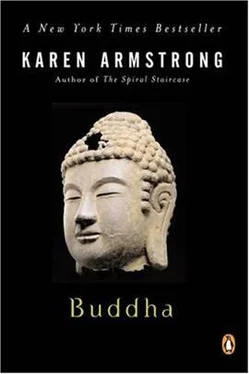The mention of the Gospels, with their colorful portraits of Jesus’s disciples, makes a Western reader long to know more about these early Buddhists. Who were these people who flocked into the Sangha by the thousand? What drew them to the Buddha? The Pali texts tell us little. The legends indicate that the first recruits came from the brahmin and ksatriya castes, though the message was preached to “the many,” and everybody was welcome to join. Merchants were also attracted to the Order; like the monks, they were the “new men” of the developing society, and needed a faith that reflected their essentially casteless status. But there are no detailed stories of individual conversions, such as the Gospel tales of fishermen dropping their nets and tax collectors leaving their counting houses. Ananda and Devadatta stand out from the crowd of bhikkhus, but their portraits are still emblematic and stylized compared with the more vivid character studies of some of Jesus’s disciples. Even Sariputta and Mogallana, the leading disciples of the Buddha, are presented as colorless figures with apparently little personality. There are no touching vignettes about the Buddha’s relationship with his son: Rahula appears in the Pali legends simply as another monk. The Buddha instructs him in meditation, as he would any other bhikkhu, and there is nothing in the narrative to suggest that they are father and son. We are left with images, not with personalities, and with our Western love of individuality, we can feel dissatisfied.
But this is to misunderstand the nature of the Buddhist experience. Many of these early monks achieved enlightenment precisely by contemplating the doctrine of anatta. This enabled them to transcend self; indeed, the Buddha denied that there was any such thing as a constant personality. He would have regarded the obstinate belief in a sacred, irreducible nub of selfhood as an “unskillful” delusion that would get in the way of enlightenment. As a result of the spirituality of anatta, the Buddha himself is presented in the Pali Canon as a type rather than an individual. He contends with other types: with Skeptics, brahmins and Jains. He owed his liberation precisely to the extinction of the unique traits and idiosyncrasies that Western people prize in their heroes. The same goes for his disciples. There is little to distinguish the Buddha from his bhikkhus, who are all depicted as minor Buddhas. Like him, they have become impersonal and have vanished as individuals. The Canonical texts preserve this anonymity by declining to delve into the secrets of their hearts. Nor will they reveal the lovable quirks in their characters before the achievement of enlightenment. It may be no accident that it is Devadatta and Ananda who stand out from the rank and file. Devadatta is filled with egotism, and the gentle Ananda has failed to achieve enlightenment and consequently has more observable personal traits than, say, a spiritual giant like Sariputta. We see farther into Ananda’s heart during the last days of the Buddha’s life, but, as we shall see, he cannot share the Buddha’s perspective. To a Westerner, who would decry this loss of personality, the bhikkhus would probably reply that the surrender of the ego was a price worth paying for the inner peace of Nibbana, which is probably impossible for anybody who is still immured in selfhood.
But the impersonality of the Buddha and his disciples did not mean that they were cold and unfeeling. They were not only gentle and compassionate, but deeply sociable, and their attempt to reach out to “the many” attracted people who found this lack of egotism compelling.
Like all his monks, the Buddha was constantly on the road, preaching to as wide an audience as possible, but during the three months of the monsoon, when travel was difficult, he took to staying in the Bamboo Grove outside Rajagaha. Even though the park now belonged to the Sangha, the bhikkhus had not built in it, but still lived in the open. A rich merchant, however, visited the Grove, liked what he saw, and offered to build sixty huts for the monks, and the Buddha gave his permission. The merchant then invited the Buddha and his monks to a meal. It was no small matter to feed such a large gathering, and on the morning of the dinner, the household was in an uproar as the servants prepared a delicious meal of broth, rice, sauces, and sweets. The merchant was so busy hurrying about and giving orders that he scarcely had time to greet his brother-in-law, Anathapindika, a merchant from Savatthi, who had come to Rajagaha on business. “Whatever is going on?” Anathapindika asked in bewilderment. Usually when he visited the household his brother-in-law could not do enough for him. Was there a wedding? Or was the family about to entertain King Bimbisara? “Not at all,” replied the merchant; the Buddha and his monks were coming to dinner.
Anathapindika could hardly believe his ears. “Did you say ‘the Buddha’?” he asked incredulously; had an enlightened Buddha truly come into the world? Could he go to visit him at once? “This is not the time,” the merchant said testily, hurrying off again. “You can go to talk to him early tomorrow morning.” Anathapindika was so excited that he could scarcely sleep, and at dawn he hurried to the Bamboo Grove. As soon as he left the city, however, he was overcome with the dread that was so widespread in the Axial countries. He felt vulnerable. “Light drained from the world, and he could see only darkness ahead.” Fearfully he pressed on, until he saw the Buddha pacing up and down in the morning light. When the Buddha saw Anathapindika, he led him to a seat and called him by name. Like Yasa before him, the merchant was immediately cheered, and as he listened to the Buddha he felt the teaching rising from within with such authority that it seemed inscribed in his deepest soul. “Superb, Lord!” he cried, and begged the Buddha to accept him as a lay disciple. The next day, he entertained the Buddha at his brother-in-law’s house and invited him to visit his own city of Savatthi, the capital of the kingdom of Kosala.
Savatthi was probably the most advanced of all the cities in the Ganges basin in the late sixth century. It was built on the south bank of the Rivati river, at the junction of two trade routes, and was inhabited by some 70,000 families. A leading center of commerce, it was home to many wealthy businessmen like Anathapindika, and the city’s name was said to derive from the word sarvamatthi, since it was a place where “everything was attainable.” Savatthi was protected by imposing walls and watchtowers forty to fifty feet high; the main roads entered the city from the south and converged in a large open square in the town center. Yet despite Savatthi’s prosperity, Anathapindika’s feverish excitement at the prospect of meeting a real Buddha shows that many people felt a nagging void opening up in their lives. It was exactly the place for the Sangha.
Anathapindika spared no expense in setting up a base for the Buddha. He searched hard for a suitable place, and eventually decided on a park owned by Prince Jeta, heir apparent to the throne of Kosala. The prince was reluctant to sell-until Anathapindika brought cartloads of gold coins, which he spread all over the parkland until the ground was entirely covered with the money that he was prepared to offer. Only a small space near the gate remained, and Prince Jeta, realizing belatedly that this was no ordinary purchase and that it might be advisable to make a contribution, threw it in for free, building a gate-house on the spot. Then Anathapindika made Jeta’s Grove ready for the Sangha. He had “open terraces laid out, gates constructed, audience halls erected, fire rooms, storehouses and cupboards built, walks leveled, wells prepared, baths and bathrooms installed, ponds excavated and pavilions made.” This would become one of the most important centers of the Sangha.
Читать дальше












